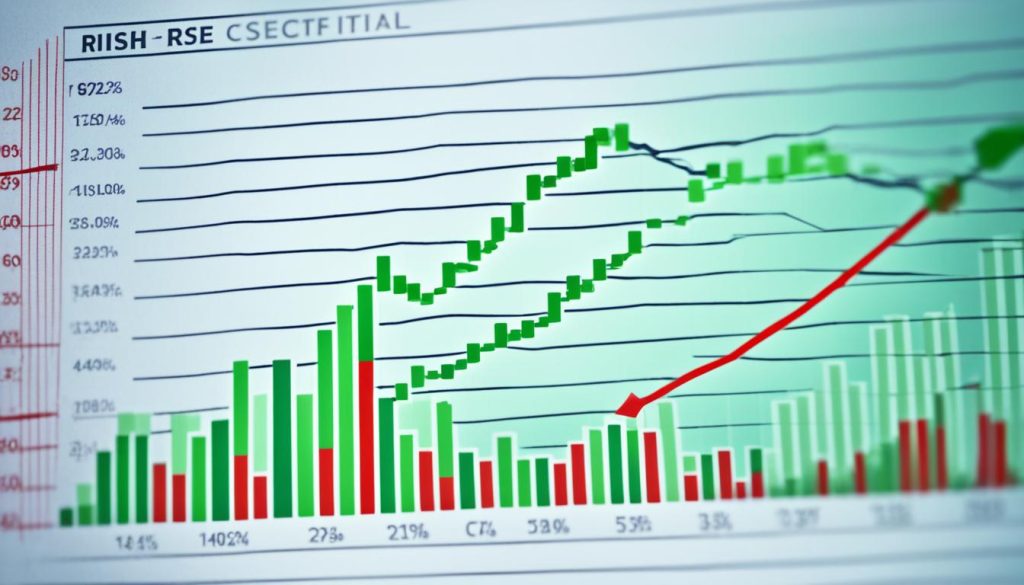The biotech industry is at the forefront of healthcare innovation. It’s creating new products and therapies that can change lives. For investors, biotech stocks offer a chance to make big profits. They support the development of new vaccines and drugs1.
But, investing in biotech needs a lot of risk tolerance and patience. The industry’s performance has been mixed lately1. Still, there are strong reasons to invest. For example, smaller biotech companies might get bought by bigger firms. New technologies could also increase productivity2.
Thinking about investing in biotech startups? It’s key to know the risks and how this industry works. This guide will look into biotech stocks. We’ll cover the good and bad, strategies, and what to think about before investing.
Key Takeaways
- Biotech stocks can experience significant surges, as seen with Novavax Inc.’s stock price surge from $6.81 to almost $300 due to COVID-19 vaccine production1.
- Biotech stock prices can also plummet quickly, as demonstrated by FibroGen’s 42% drop in one day due to a negative FDA recommendation1.
- The biotech sector is highly complex, making it challenging for non-experts to assess a product’s effectiveness and success probability1.
- Venture capital investment into biopharma startups is at record levels, with over $75B in deals, $23B in IPO proceeds, and $150B in M&A consideration since 20182.
- The total cost of developing a successful drug can exceed $2.5 billion, with an average development period of around eight years3.
Understanding Biotech Stocks
Biotech stocks are becoming more popular for investors. They are shares of companies that work on making medicines, vaccines, and biological products. Biotech uses living organisms, unlike pharmaceuticals which use chemicals4.
Top S&P 500 biotech stocks from last year include Regeneron Pharmaceuticals, Vertex Pharmaceuticals, and Incyte Corp4. These big biotech companies have many products that help with different health issues. Their success depends a lot on the healthcare industry’s trends4.
Large-Cap vs. Small-Cap Biotech Stocks
Small-cap biotech stocks are smaller and focus on one treatment for a specific disease. Their stock prices can change a lot when news about clinical trials or FDA approvals comes out. Good news can make their stock go up a lot, but bad news can end the company4.
The biotech industry is risky but can also be very rewarding. Big biotech companies are more stable, but small ones could offer big gains. But, they also come with bigger risks. It’s important to know the differences before investing4.
“Biotech stocks are not for the faint of heart. The industry is characterized by extreme volatility, but also the potential for substantial rewards for those willing to navigate the risks.”
If you like the new science in biotech or want big returns, be careful and plan your investments well. Knowing the differences between big and small biotech stocks helps you see the risks and chances in this exciting field4.
Pros and Cons of Investing in Biotech Stocks
The biotech industry is booming, making up 17.3% of the U.S. economy in 20224. It’s a sector full of potential for investors who know where to look. But, like any investment, it comes with its pros and cons.
Pros of Biotech Stocks
Investing in biotech can lead to big gains. Small biotech companies, in particular, can soar as they introduce new drugs to the market1. The industry’s focus on innovation makes it a promising place to put your money4.
Big biotech companies often share profits with investors through dividends. Some have even raised their dividends every year for over 25 years4. This makes them a steady choice for investors looking for regular income5.
When thinking about biotech stocks, consider names like Regeneron Pharmaceuticals (REGN), Vertex Pharmaceuticals (VRTX), and Sanofi SA (SNY)5. These companies are strong based on expert opinions, size, and financial health5.
“Biotech investments with healthy balance sheets and a diverse portfolio of advanced drug candidates and commercial-stage products can provide substantial returns.”
But, the biotech industry is not without its risks. Bringing a new drug to market can take a decade and cost a billion dollars, and most won’t make it5. This makes investing in small biotech companies risky for some investors5.
When looking at biotech stocks, think about the benefits like potential gains and dividends. But, also consider the ups and downs of the industry and the risks. It’s key to do your homework, diversify, and get advice before adding biotech to your portfolio.
Is It Worth Investing in Biotech Startups?
Investing in biotech startups is a risky move. On one hand, early investors in companies like Moderna have seen huge returns6. On the other hand, the risks are high, especially because biotech is heavily regulated6.
Biotech startups need a lot of money for research and development, clinical trials, and getting approved by regulators6. They can’t usually start making money right away6. But, government grants and subsidies help by providing funding for these costs6.
| Funding Source | Key Considerations |
|---|---|
| Government Grants and Subsidies |
|
| Angel Investors |
|
The challenges of biotech startups are big, but the rewards can be huge6. Investors need to understand the industry and its science well to manage risks6. Biotech has done well financially, beating tech in recent years7.
“Bootstrapping is less suitable for investment-intensive sectors like biotech, but it can be feasible for fields such as health tech or diagnostics.” – Jörg Klumbis
In summary, investing in biotech startups is risky but can be very rewarding. Investors must think carefully about the risks and challenges these companies face6. With good research and a strategic plan, investing in biotech can be a great opportunity678.
Strategies for Investing in Biotech Stocks
Investing in biotech has many options. You can buy stocks, use ETFs, or trade stock options. Each method has its own pros and cons9.
Individual Biotech Stocks
Buying biotech stocks can be rewarding if you do your research. Small, early-stage companies might see big gains if their new treatments work out9. But, many biotech projects don’t pass the tough approval process. It’s wise to keep biotech stocks to 10% of your portfolio9.
Biotech Stock ETFs
For a more spread-out investment, consider biotech ETFs. These funds cover a range of biotech stocks, from big names to small, new companies910. You can pick ETFs focused on big or small biotechs. Looking at an ETF’s mix helps you see its risk and diversification level.
Biotech Stock Options
Options trading is for those who like a bit more risk. Buying calls on promising biotech companies could lead to big gains if their stocks go up. Buying puts on failing companies can also be profitable. But, options trading comes with big risks and rewards11.
Investing in biotech needs careful thought on risks and rewards. Diversifying can help you benefit from the industry’s growth while reducing risks910.
| Company | Market Cap | Average 3-Month Volume |
|---|---|---|
| UnitedHealthcare (UNH) | $492.49B | 3.14M |
| Johnson and Johnson (JNJ) | $462.84B | 3.94M |
| Eli Lilly and Company (LLY) | $347.11B | 3.17M |
| Novo Nordisk A/S (NOV) | $302.13B | 1.33M |
| Pfizer Inc (PFE) | $289.87B | 21.49M |
The biotech industry is always changing, offering many ways to invest. Knowing the risks and benefits of stocks, ETFs, and options helps you choose the right strategy for your goals and risk level91011.
“The biotech industry is perceived as less risky now by venture capitalists compared to the past.” – McKinsey9
Conclusion
Investing in biotech startups is risky but can also be very rewarding. The industry is heavily regulated, with the FDA playing a big role in success or failure12. These startups have the power to change the game with new therapies for diseases that were once untreatable12. But, many of these drugs don’t make it to market, showing the high failure rate12.
Small-cap biotech stocks can swing wildly with news from clinical trials and regulatory decisions13. Starting a biotech company needs a lot of money for research and development13. The market’s ups and downs can quickly change a company’s value13. Yet, investing early in a biotech company that succeeds can lead to big gains.
Investors should think about how much risk they can handle and spread out their biotech investments13. Things like regulatory issues, patent fights, and protecting intellectual property can affect a startup’s finances14. Getting a new drug or therapy approved takes a long time and costs a lot, with many clinical trials and data collection12. So, investing in biotech needs a lot of research and understanding of the industry’s challenges and chances.
FAQ
What are biotech stocks?
What’s the difference between large-cap and small-cap biotech stocks?
What are the pros of investing in biotech stocks?
Is it worth investing in biotech startups?
How can investors approach investing in biotech stocks?
Source Links
- The Ups and Downs of Biotechnology
- Expected returns for biotech venture investments
- Biotech Valuation Idiosyncrasies and Best Practices | Toptal®
- 5 Best-Performing Biotech Stocks for July 2024 – NerdWallet
- Best biotech stocks in July 2024
- The ABC of biotech startup funding
- Anatomy of a decacorn: tech vs. biotech
- Biotech fundraising in 2024: a story of haves and have-nots
- 6 strategies for successful biotech funding
- How to Invest Smart in Biotech Stocks
- Biotech Investing 101
- Investing in Biotech Startups: A Guide for Savvy Investors – FasterCapital
- Biotech Startups Valuation: Challenges and Solutions | Finro Financial Consulting
- The Return of Funding to Biotech



